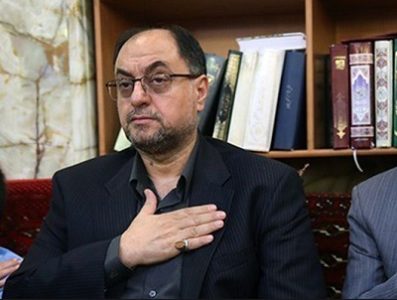Former Revolutionary Guards commander Vahid Haghanian, a close aide to Supreme Leader Ayatollah Ali Khamenei, has entered the race for Iran’s presidency following the sudden death of Ebrahim Raisi in a helicopter crash. Haghanian cited his 45 years of experience in the presidency and the leader’s office as his primary qualifications.
US Sanctions on Haghanian
In 2019, the U.S. Treasury sanctioned Haghanian, labelling him as part of Khamenei’s inner circle responsible for promoting domestic and foreign oppression. These sanctions were part of a broader effort to target key figures in Iran’s political and military establishment. The US accused these individuals, including Haghanian, of being involved in activities that undermined human rights and supported terrorism.
OFAC designated Vahid Haghanian who has been referred to as the Supreme Leader’s right hand. A former military commander, Vahid Haghanian was acting as an executive deputy for the Supreme Leader and usually accompanied the Supreme Leader on social engagements.
Implications of the Sanctions
The sanctions against Haghanian included asset freezes and travel bans. This designation means that any of his assets within US jurisdiction are blocked, and US persons are generally prohibited from engaging in transactions with him. The sanctions were intended to isolate him financially and diplomatically, making it difficult for him to operate on the international stage.
You may also like to read more about the OFAC Orders
Iran has consistently dismissed US sanctions as unfounded and politically motivated. Iranian officials argue that these measures are part of a broader strategy to exert pressure on Iran’s political and military leadership. Despite the sanctions, Haghanian’s entry into the presidential race suggests that he retains significant influence within Iran’s political framework.
Other Presidential Candidates
Other prominent figures have also registered for the presidential election, including former parliamentary speaker Ali Larijani and ex-central bank governor Abdolnaser Hemmati. The registration period saw a diverse array of candidates, reflecting the intense competition for the presidency in the wake of Raisi’s death.
Critical Impact of 1979 US Sanctions: Iran’s Aviation Cripples with Ageing Fleet
The Guardian Council, a powerful cleric-led body, will vet all presidential candidates and publish the list of those who qualify on June 11. This council has the authority to disqualify candidates, and it has historically excluded many moderates and reformists from running, which often skews the election in favor of hardliners.
Impact on the Election and Beyond
The death of Ebrahim Raisi, once considered a potential successor to the 85-year-old Supreme Leader Khamenei, has intensified the power struggle among hardliners. This election is seen as a pivotal moment that could shape the future leadership of Iran. With the potential disqualification of moderate candidates, the election could lead to further consolidation of power among hardliners.
Devastating Impact of US Sanctions: 25-Year-Old Helicopters Led to Iran’s Presidential Tragedy
Whoever wins the presidency will face significant challenges, including a struggling economy, international sanctions, and widespread public discontent. The new president will also need to navigate complex relationships with both domestic power brokers and international actors, particularly in the context of ongoing tensions with the United States.
The entry of Vahid Haghanian, a US-sanctioned figure, into the presidential race adds a layer of complexity to an already contentious election. His candidacy underscores the deep-rooted power struggles within Iran and highlights the significant impact of US sanctions on the country’s political landscape. As the election unfolds, the world will be watching closely to see how these dynamics play out and what they mean for the future of Iran.


